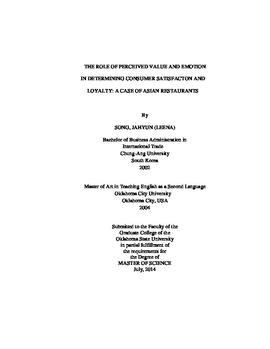| dc.description.abstract | The purpose of this study were (1) to propose and test a model of consumer choice behavior that examines the role of perceived value, emotions, and individual differences in determining consumer satisfaction and loyalty in a case of Asian restaurants, and (2) to provide practical recommendations to ethnic restaurant marketers, particularly in the Asian restaurant sector. This study followed the regulatory focus theory, which proposes motivational difference in goal setting that each regulatory system controls and influences consumers' decision making process. In the context of this theory, the study suggested that individuals' psychological differences are significant antecedents that influence their cognitive evaluations of and emotional responses from dining experiences at Asian restaurants, which consequently determine consumer satisfaction and loyalty. The target population of the study was frequent American travelers who had entered their email addresses into a public email database and who have visited any Asian restaurant within the previous 30 days. For data collection, an online survey was employed by using a convenience sampling approach. A total of 435 responses were analyzed using confirmatory factor analysis, structural equation modeling, and analysis of variance methods. Overall, the results of this study indicate that perceived value and emotional responses play significant roles in determining consumers' satisfaction and loyalty in the ethnic restaurant context. Specifically, the findings indicate that utilitarian value induces American consumers' satisfaction and loyalty more than hedonic value does. Furthermore, while researching the influences of individual factors, this study discovered that the promotion focus affected utilitarian value as well as hedonic value and positive emotions which previous literature has generally indicated, whereas the prevention focus did not influence any value dimensions; instead it had significant effects on negative emotions. Lastly, the findings regarding the development stage of each ethnic cuisine suggested that American consumers of narrow-stage Asian restaurants (Japanese restaurants in this case) are searching for unique and exotic dining experiences (i.e., hedonic value) that encourage positive emotions. In contrast, consumers were more likely to consider the utilitarian value aspects of dining services (e.g., food tastiness, food portion) while dining at Asian restaurants within the expanding stage (Thai restaurants in the present case). | |
